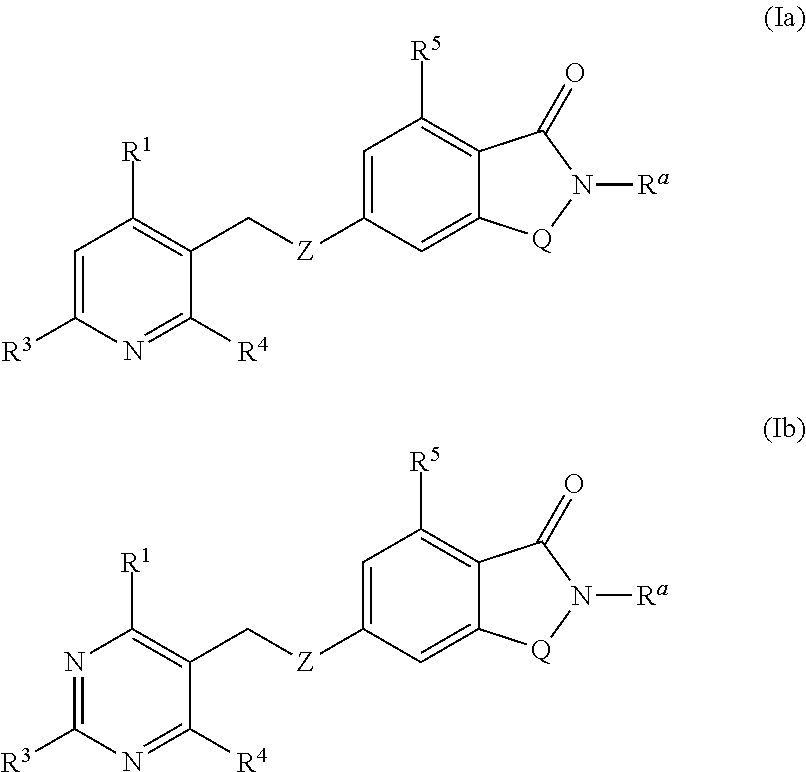Novel small molecule potentiators of metabotropic glutamate receptors i
a technology of metabotropic glutamate and small molecules, which is applied in the direction of heterocyclic compound active ingredients, biocide, drug compositions, etc., can solve the problems of limiting the usefulness of such approaches, the receptor binding profile and/or the pharmacological profile is not always satisfactory, and the side effects are not easy to achieve. , to achieve the effect of enhancing the function of the receptor, increasing the response of the mglu receptor, and increasing the response of the receptor
- Summary
- Abstract
- Description
- Claims
- Application Information
AI Technical Summary
Benefits of technology
Problems solved by technology
Method used
Image
Examples
preparation examples
[0254]Abbreviations used in the Examples that follow are: DCC dicyclohexylcarbodiimide; DCM dichloromethane; DMA N,N-dimethylacetamide; DMAP 4-dimethylaminopyridine; DMF dimethylformamide; DMSO dimethylsulfoxide; Et2O diethyl ether; EtOAc ethyl acetate; MeCN acetonitrile; MeOH methanol; RT room temperature; sat. saturated solutions; TFA trifluoroacetic acid; THF tetrahydrofuran; MP-CNBH3 macroporous cyanoborohydride.
Preparative Example 1
ethyl 4-phenoxynicotinate
[0255]DCC (5.24 g, 25.4 mmol) was added in portions over 10 min to a solution of 4-chloronicotinic acid (2.00 g, 12.7 mmol), ethanol (1.75 g, 38.1 mmol) and DMAP (0.19 g, 1.52 mmol) in DMF (20 mL) at 0° C. After stiffing for 1 h the reaction mixture was allowed to warm to room temperature and stirred overnight. Water (100 mL) was added and the solid formed was filtered off. The filtrate was extracted with DCM, washed with water, dried (MgSO4) and the solvent was removed in vacuo. The crude ethyl 4-chloronicotinate (5.8 g) was...
example 1
2-butyl-5-((2,6-dimethyl-4-phenylpyridin-3-yl)methoxy)isoindolin-1-one
[0275]2-Butyl-5-hydroxyisoindolin-1-one (366 mg, 1.78 mmol), K2CO3 (493 mg, 3.57 mmol) and KI (296 mg, 1.78 mmol) were added to a solution of (2,6-dimethyl-4-phenylpyridin-3-yl)methyl methanesulfonate (520 mg, 1.78 mmol) in DMF (18 mL). After stirring overnight at room temperature (rt), water was added and the pH was adjusted to 13-14 using aqueous NaOH (1 M). The reaction mixture was extracted with EtOAc, the combined organic layers were washed with water, dried with MgSO4 and the solvent was removed in vacuo. Purification by flash chromatography (DCM / MeOH, gradient 1-5% MeOH) provided 2-butyl-5-((2,6-dimethyl-4-phenylpyridin-3-yl)methoxy)isoindolin-1-one (140 mg, 19%). ESI-MS [M+H]+=401.2.
[0276]The following compounds of example 2-5 were prepared in a manner analogous to the preparation of 2-butyl-5-((2,6-dimethyl-4-phenylpyridin-3-yl)methoxy)isoindolin-1-one:
example 2
5-((2,6-dimethyl-4-phenylpyridin-3-yl)methoxy)-2-(2-(trifluoromethoxy)ethyl)isoindolin-1-one
[0277]ESI-MS [M+H]+=457.2.
PUM
| Property | Measurement | Unit |
|---|---|---|
| temperatures | aaaaa | aaaaa |
| temperature | aaaaa | aaaaa |
| temperature | aaaaa | aaaaa |
Abstract
Description
Claims
Application Information
 Login to View More
Login to View More - R&D
- Intellectual Property
- Life Sciences
- Materials
- Tech Scout
- Unparalleled Data Quality
- Higher Quality Content
- 60% Fewer Hallucinations
Browse by: Latest US Patents, China's latest patents, Technical Efficacy Thesaurus, Application Domain, Technology Topic, Popular Technical Reports.
© 2025 PatSnap. All rights reserved.Legal|Privacy policy|Modern Slavery Act Transparency Statement|Sitemap|About US| Contact US: help@patsnap.com



